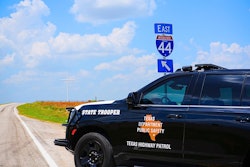The big story around trucking for much of the year has been around non-domiciled CDLs and, to a lesser extent, driver training regulations.
The Department of Transportation is looking to limit which non-citizens can hold a CDL, and many around trucking believe training standards should get a closer look.
In this part two of our conversation with 160 Driving Academy's Steve Gold, we hear about what kind of impact his company is seeing and what he expects as we move into 2026.
[Related: Will CDL crackdown spur COVID-era 'free-for-all' for truck drivers?]
Contents of this video
00:00 CCJ Webinar promo
00:39 10-44 intro; Truck driver training, trucking safety and recruiting
01:30 Driver turnover problem in long-haul truckload segment
03:56 Why aren’t drivers sticking around?
04:51 DOT expects nearly 200,000 drivers to be forced out of trucking
06:02 Entry-Level Driver Training requirements and training providers
08:56 2026 driver recruiting outlook
Jason Cannon:
In partnership with Netrayne, CCJ will host a complimentary webinar December the fourth at 1:00 PM Central time with fleet leaders to discuss the tactics that they deploy to keep drivers happy, engaged, and on the company payroll. This discussion is born from CCJ's 2025, What Drivers Want report. That's a survey of company drivers and leased owner-operators who shared their thoughts on pay, benefits, equipment, technology, why they would leave a motor carrier and much more. All registered attendees will receive a complimentary copy of the What Drivers Want report courtesy of CCJ and Netradyne. A link to registration can be found in description field below this video.
Matt Cole:
How truck driver training turnover, and immigration related regulations are impacting trucking safety and recruiting.
Jason Cannon:
Hey everybody. I'm Jason Cannon, my co-host. On the other side is Matt Cole, and welcome to part two of our look at truck driver recruiting and retention with Steve Gold, CEO of 160 Driving Academy and Truckers Network Association. If you missed last week's episode, no worries, you can still find it on this channel. The American Trucking Associations at its annual Management Conference and Exhibition last month changed its long-held stance on the issue of a driver shortage in trucking and said that instead of a shortage of actual drivers, the real shortage is a lack of quality drivers.
Matt Cole:
While that may be the case, there's no doubt that particularly in Trucking's long haul truckload segment, there is a driver turnover problem at fleets.
Steve Gold:
The 160 Driving Academy is the largest commercial truck driving school in the nation. I started the company 13 years ago with our first school in Peoria, Illinois, and now we have 150 schools in 43 different states. We'll train 20 some odd thousand people this year how to drive a semi-truck. Essentially, we're the largest provider of truck drivers into the trucking industry, and essentially that's what we do. We are state licensed everything due 160 hours of training and have a high quality focused safety program for training. I think driver turnover is the number one issue for the industry. How do you keep a good driver? You pay 'em more or you give 'em better benefits. It's a hard job. Let's start with it's a hard job and every industry has turnover. It's exacerbated in the trucking industry. I mean, I see it as, and I use this phrase two months ago, there's a shortage of quality drivers and then at the American Trucking Association goes, oh yeah, there's a shortage of quality drivers.
So I felt that's sort of nice flattery. But look, we have a secondary product beyond schools where we score drivers for large companies. So we actually evaluate drivers. If you're a carrier, you need a driver qualification file for each driver, and you've got to fill out a form per the F-M-C-S-A and evaluate that driver. Well, there's some companies we outsource that for. We do it for, because if I work for you and you're a small carrier and you need a driver right away, like, Hey, Steve's a good driver, and you sort of just put the form in and you're good. And then I put the truck over the side of the road, so you really didn't evaluate me probably properly. So we outsource that for companies. There's a lot of bias in evaluating a friend who needs a job kind of thing. So when we do that for a large carriers and small carriers and some shippers, about 50% of those drivers score 50 or below, they're not safe. You wouldn't hire 'em for your fleet. So those companies reject those individuals, but those individuals who get rejected by these fleets, they go work somewhere else. So you're talking about half the workforce is scoring that we're examining, think it's a representative sample, are not safe drivers. They shouldn't be in the industry. There's a shortage of quality, safely trained drivers in the industry. There's a lot of people running around with commercial driver's license in their pockets. They're not safe. You wouldn't hire 'em, but someone's hiring 'em out there. That's the problem. That's the risk.
Jason Cannon:
So why aren't good drivers sticking around at the fleet that hires 'em and sometimes even leaving the industry altogether?
Steve Gold:
Well, they got to pay 'em better. I'm happy to say we turn out safe drivers who have 160 hours of training at a minimum into the industry, and we do a lot of work for a large shippers, and those companies don't have the turnover of the trucking industry. I was the chief supply chain officer at PepsiCo. I didn't have massive turnover like you see in the industry. Why not? Because it was the same job and driving over the road and being away from home, and we didn't have that turnover problem like the industry does. So either the industry doesn't have enough support for their driver base, whether it's benefits pay management or I don't know how else to explain it because you can look at other companies like UPS, like the LTL industry doesn't have that kind of turnover. They have a lot of turnover, but they don't have over a hundred percent like some of these carriers. I think it comes down to pay and quality of life and how these employers are treating 'em
Matt Cole:
With the Trump administration's crackdown on English language proficiency for truck drivers and non domiciled CDLs. The DOT expects nearly 200,000 drivers to be forced out of trucking
Steve Gold:
For us, we're getting tons of calls because they're pulling so many drivers off the highway or there's so many non drivers who shouldn't be in this country. I think they're not driving or you're reading last week in Indiana between the state of Indiana federal government, they had a sting operation. They took 120 CDL drivers or 120 drivers off the highway, and they did the same thing in Oklahoma. So I think the states are finally cracking down because they're realizing finally the federal government is concerned about safety under Secretary Duffy who's doing an amazing job. Maybe the industry is coming back. It's not because demand of goods and shipments are going up, it's because they're taking capacity out of the industry, which is what we really need. I don't know. I've seen estimates like 200,000 drivers need to come out at least. So for us, it's been good. People are getting serious about, well, I guess I can't get away with it and bluff my way, the F-M-C-S-A anyway anymore. I need quality drivers. So we're getting a lot of calls from shippers and carriers. Hey, can we get some drivers from you? Can we send some people to you? How do we work together? It's been good for us.
Jason Cannon:
Another issue Steve sees with driver training and recruitment is the entry level driver training requirements, and who is allowed to be an official training provider under that rule?
Steve Gold:
The rule, and it's in place in 2022, February, 2022, and there's so much fraud and abuse in the F-M-C-S-A registry. There's like 35,000 people say they're training providers. Who is that? Small carriers who have blown off state rules, large carriers who have blown off state rules. Literally, there's Baptist Church in there that says, I I'm a training provider. I'm not kidding you in Joe's towing service. Do you think those drivers are getting 160 hours of training or quality training either at my company or competitors of mine? No. And then there's totally correlated number of accidents on the highway. Of course, no one gets trained. Nefariously gotten the F-M-C-S-A training provider registry. Nobody cares, and then they don't work for the employer who trained them anymore, and they go, bad things happen. So I think either 160 hours or Secretary Duffy can solve this problem. Secretary Duffy has the control switch at the entry level driver training, and it was supposed to be when they set it up to get into that registry, we were supposed to be state licensed first, and that was a minimum requirement.
So there's 2100 schools like mine across the country that are state licensed. I'm licensed in 43 states. These are rigorous conditions. The states are accountable for driver's licenses. That's how it was. Federal government came in three years, go, yeah, we'll just have a federal registry too, and employers are exempt. Everyone's exempt. It's like giving out candy like, Hey, I want an exemption. I train my own people. There's no checks and balances, and so something is going to happen. I see Senator Cotton propose a minimum hours requirement in a bill yesterday. Like, okay, mean stuff moving very, very quickly. But Secretary Duffy just go, look, I only want state licensed schools in the training provider registry. That solves the whole problem, solves 99% of the problem, all the stuff that's going on for a long time, which has diminished with the quality of training and downstream safety and then fatalities.
You could trace it. This guy in Florida, unfortunately over the summer, couldn't speak or read English non domicile. CDL. How did he get his California CDL? That is such a mystery. People ask me that all the time. I don't know. How does the DMV issue that guy who trained him? And I think the other thing is these accidents. Plen lawyers are all over trucking companies, right? Nuclear accidents, all that stuff. Plaintiff's, lawyers, I understand are starting to look at the training provider now. Accidents are going to happen if you look at did you really get trained by somebody who is legitimate or not? And then I think that's going to happen. So I think you had a few things going on which are positive with a minimum hours. I think that would be a good thing. Obviously we train everybody 160 hours. Tower Company got its name, but there are other tools that Senator Duffy can do absent new legislation that are much easier and more efficient.
Matt Cole:
Steve says that going into 2026, driver recruiting is going to be even more challenging than it already is for fleets.
Steve Gold:
I think as we get into 2026, recruiting is going to be harder. It is going to be harder to find qualified drivers, which means more trucks are going to sit, which means rates are going to go up, which means wages are going to go up, which means there's going to be more churn in the industry. So I would say for trucking companies or shippers or anybody with a fleet, they've got to be prepared. Now, if you're not training and hiring and planning, now it's the beginning of November, you got to start your recruiting schedule and either working with schools like mine or others, that's what people are calling us like crazy. You have to start now because if you miss it, you're already into June and you don't have enough drivers and that's going to be a problem. So I just think it's going to be a lot harder as going to in 2026. It feels a little bit like COVID when you could not find enough drivers during COVID and wages went up and signing bonus went up. So I think we're going to get back to that pretty quickly here, which means rates are going to go up for the industry too, which everybody wants.
Jason Cannon:
That's it for this week's 10 44. You can read more on ccj digital.com. While you're there, sign up for our newsletter and stay up to date on the latest in trucking industry news and trends. If you have any questions or feedback, please let us know in the comments below. Don't forget to subscribe and hit the bell for notifications so you can catch us again next week.











